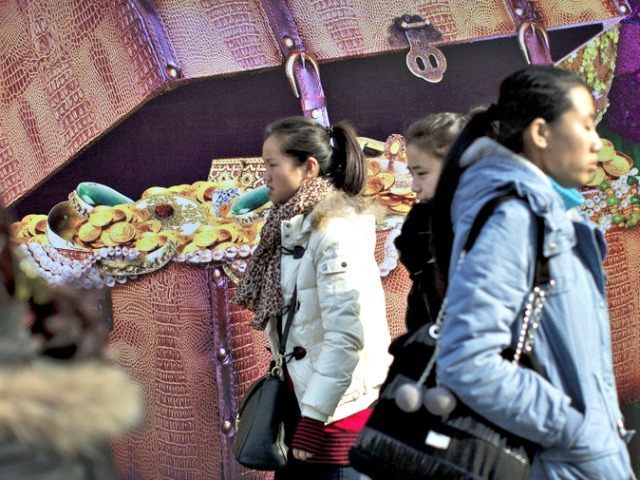China’s Shanghai stock market suffered another -6 percent crash on Friday to cap its worst three-week decline since 1992.
With Chinese stock down by a third since its June peak, the “Red Dragon” may be facing a weekend similar to the crisis that began on Friday, September 12, 2008 that led to the Monday bankruptcy of Lehman Brothers. That crisis caused $15 trillion in losses; China’s crisis has the potential to be worse.
Real panic was unleashed across China on Friday as stock brokers started “calling-in” margin loans that millions of small investors had used to leverage up returns in China’s bull market that rose by 150 percent, before its recent crash. With the biggest three week loss since 1992, Chinese stocks are now down by $3.7 trillion since April.
Diana Choyleva at Lombard Street Research, who closely follows international liquidity flows, points out that China’s bull market was not powered by the usual rapidly growing credit and liquidity that have preceded almost every stock bull market in history. Over the last twelve months, the “broad money” available from China’s domestic banks and notorious “shadow banking” sector suffered a record -10.2 percent collapse, China’s first sustained fall since the supposed “China Economic Miracle” began back in 2000.
Lombard’s analysis illuminates that China’s economy with a back-to-back GDP shrink in the fourth quarter of 2014 and the first quarter of 2015, as the domestic demand plunge is nearly as weak as in the worst of the 2008-09 Global Financial Crisis.
But the Chinese stock markets took off in November after the People’s Bank of China made their first interest cut, and Chinese investors were convinced that the government would massively stimulate the economy like they did in 2008.
Choyleva warns that if the +150 percent up-move in Chinese stocks was not “propelled by an excessive injection of money into the economy,” then the rally must have been driven entirely by what economists refer to as a “greater appetite for risk-taking.”
China has what may be referred to as a “stock market”, but in “substance it differs from its Western counterparts. Profits and valuations have very little to do in determining where the market is headed. Liquidity is king in this casino-like marketplace, where all investors, retail and professional, are short-termist.” Choyleva adds that an investment horizon stretching more than a month for the China fund managers she advises is rare.
The interest rate cuts and slashing the ratio of cash collateral banks are required to hold to remain solvent demonstrates that that the China stock market rally still has the full blessing of the ruling Communist Party. That is the biggest reason Friday’s crash is so frightening— that the vaulted Chinese government hasn’t been able to stop the crash.
The situation eerily reminds me of September 2008 when almost every “expert” believed that the US Federal Reserve would never allow a gut-wrenching American stock market crash. But then Lehman Brothers got a $5 billion margin call on what the Wall Street Journal called ‘The Weekend That Wall Street Died.’
On September 12, 2008, the Dow Jones Industrial Average opened down -150 points but rallied back to finish the day with a slight loss of 11.71 points. Rumors were spreading that the 25,000 employee brokerage firm Lehman Brothers was having financial troubles, but it was known that Federal Reserve was expected to arrange a merger with a stronger firm over the weekend.
But despite those efforts to facilitate a merger of Lehman Brothers with either Barclays Bank or Bank of America, the deals collapsed on Saturday. With American and international banks incestuously linked in junk bond trading and sub-prime lending, world financial markets panicked on the evening of Sunday September 14th.
The Lehman bankruptcy on Monday led to a 5,000-point plunge in the Dow Jones Industrial Average, cost 6 million US jobs, and caused $15 trillion in worldwide financial losses in the worst financial crisis since the Great Depression.
The crisis China is now facing could be over four times worse than the Great Financial Crisis. U.S. stocks in 2008 were trading at 21.46 times current earnings, but Chinese stocks are trading at 90 times earnings.
Most analysts this weekend are worried about what Greece will do about its debt that doubled to $355 billion since 2007. But China’s debt has quadrupled in the same period from $7 trillion to $28 trillion, according to McKinsey & Company consultants.
China’s spectacular debt load and economy in the worst shape since their “Economic Miracle” began 15 years ago is a very alarming combination. The Chinese government is no doubt furiously working this weekend to prevent a Lehman type collapse. China will face its moment of truth when the Shanghai Stock Exchange opens at 9:15 am local time on Monday morning.

COMMENTS
Please let us know if you're having issues with commenting.